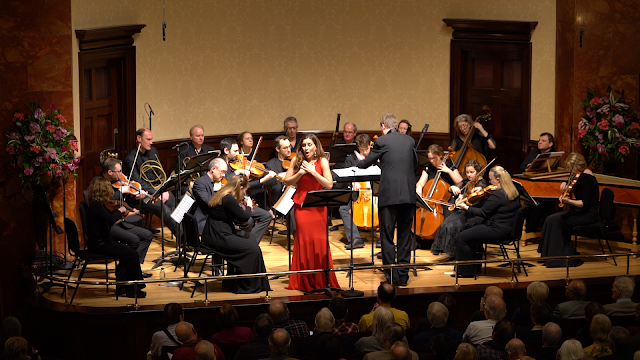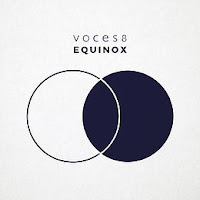 |
| Ethel Smyth |
The Barbican's classical music programme for the 2018-19 season has just been announced. The season is a partnership between the Barbican, its resident and associate ensembles - the London Symphony Orchestra, the Britten Sinfonia, the Academy of Ancient Music and the BBC Symphony Orchestra - and the Guildhall School of Music and Drama. For me, one of the big highlights must be the performance of Ethel Smyth's Mass in D with the BBC Symphony Chorus, BBC Symphony Orchestra, conductor Sakari Oramo in a concert which celebrates both the chorus's 90th birthday and the 100 years since the successful Parliamentary appeal for universal suffrage, with soloists Lucy Crowe, Catriona Morison, Ben Johnson and Duncan Rock. And the concert is completed by the original version of Tchaikovsky's Piano Concerto No. 1 with Pavel Kolesnikov.
Another commemoration during the season is the end of World War One. The London Symphony Orchestra will premiere James MacMillan's
All the Hills and Vales along which sets poetry by Charles Sorley who was killed in action in 1915. The Britten Sinfonia will be giving the premiere of Nico Muhly's
The Last Letter which sets last letters sent by soldiers on both sides of the conflict. And there will be a BBC Total Immersion Day on music arising out of the First World War including a performance of Mark-Anthony Turnage's opera
The Silver Tassie with Ryan Wigglesworth conducting the BBC Symphony Orchestra and Ashley Riches as Harry
, and the BBC Singers under their new chief conductor Sofi Jeanin will be performing two new works inspired by the event, from
Roderick Williams and from
Bob Chilcott.
Other operas in the season include Janacek's
The Cunning Little Vixen in a semi-staged performance directed by Peter Sellars with Simon Rattle conducting the London Symphony Orchestra and soloists Lucy Crowe, Gerard Finley, Willard White, Sophie Burgos and Peter Hoare. Purcell's
Dido and Aeneas forms the conclusion of the Academy of Ancient Music's trilogy of Purcell stagings, and Christine Rice will be taking the title role, and Richard Egarr will also be including Purcell's music for
Dioclesian in the concert. At the end of the season the Academy of Ancient Music returns to opera, in collaboration with the Grange Festival when they present Mozart'
The Marriage of Figaro
As part of the continuing Bernstein Centenary celebrations, Marin Alsop conducts the London Symphony Orchestra in a concert performance of
Candide with Leonardo Capalbo, Jane Archibald, Anne Sofie von Otter and Thomas Allen. Contemporary Irish opera also makes an appearance with the UK premiere of Enda Walsh and
Donnacha Dennehy's
The Second Violinist produced by Landmark Productions and National Irish Opera. The Britten Sinfonia is conducted by Mark Elder in Donizetti's
Il Paria with Albina Shagimuratova, the latest in Opera Rara's projects.
Joyce DiDonato takes the title role in Handel's
Agrippina with Il Pomo d'Oro, and the group will present Handel's
Serse with Franco Fagioli and Vivica Genaux, Handel's
Semele from Harry Bicket and the English Concert, Handel's
Brockes Passion from the Academy of Ancient Music, the BBC Singers will join the Academy of Ancient Music for Handel's
Israel in Egypt, Thomas Ades completes his Beethoven cycle with the Britten Sinfonia with Beethoven's
Symphony No. 9,
Other new music includes the world premiere of
Harrison Birtwistle's
Fanfare as part of the London Symphony Orchestra's opening concert of the season, and another new work from Birtwistle to be premiered by the LSO in May 2019, the LSO will also be premiering pieces by two composers from the orchestra's new music development programme,
Liam Mattison and
Donghoon Shin. The BBC Symphony Orchestra will be premiering new pieces by
Richard Causton,
Cheryl Frances-Hoad,
Gavin Higgins and
Pawel Szymanski, plus giving the UK premieres of a number of pieces by
Thomas Larcher. Harpsichordist Mahan Esfahani will be giving the premiere of
Sunleif Rasmussen's
Quadroforone, and the UK premiere of a new piece by
Anahita Abbasi.
Olga Neuwirth's new score for the 1924 film
Die Stadt ohne Juden, directed by H K Breslauer, will receive its UK premiere at a screening of the restored silent film. Roderick Williams is the Milton Court Artist-in-Residence and he will be giving the premiere of a new song cycle by
Ryan Wigglesworth, and there will the UK premiere of a work by Williams.
Another mini-residency is that of Diana Damrau who will be singing Richard Strauss in three concerts, including a recital with Helmut Deutsch, the
Four Last Songs and the final scene from
Capriccio. Other gleanings include Nigel Kennedy joining the Academy of Ancient Music to play Bach, an intriguing pairing indeed, the BBC Symphony Orchestra and Chorus in Bach's
Mass in B minor conducted by John Butt, Bernard Haitink celebrating his 90th birthday with Dvorak and Mahler with the LSO,
Visiting ensembles to the Barbican include Richard Tognetti and the Australian Chamber Orchestra, who are Barbican International Associate Ensemble at Milton Court, Adam Fischer and the Vienna Philharmonic Orchestra, Mariss Jansons and the Bavarian Radio Symphony Orchestra, Antonio Pappano and the Orchestra dell'Accademie Nazionale di Santa Cecilia, Mirga Grazinyte-Tyla and the City of Birmingham Symphony Orchestra (in Ravel's
Daphnis and Chloe and Stravinsky's
Rite of Spring in the same concert), Maxim Emelyanychev and Il Pomo d'Oro (in Handel's
Serse and
Agrippina), Philippe Herreweghe and Collegium Vocale Ghent, William Christie and Les Arts Florissants (in Bach's
St John Passion), and Herve Nique and Le Concert Spirituel.
Full details from the
Barbican website.























![outdoor market, in Castle Square, photographed from St Laurence's Church. By en:User:Merlincooper - [1], Public Domain, https://commons.wikimedia.org/w/index.php?curid=11691652 outdoor market, in Castle Square, photographed from St Laurence's Church. By en:User:Merlincooper - [1], Public Domain, https://commons.wikimedia.org/w/index.php?curid=11691652](https://blogger.googleusercontent.com/img/b/R29vZ2xl/AVvXsEiCnGkyh7gUMZAh52unCHy5wrDjvcpgQrVtkSIochS-b-iXQKciyrU8THljSRBsa5VuBH-h1DMVSugJCT6DlI5ZT_36fc3_aabx8nKxdtzAi2TYA6XxVbI8odgukfQBlX1Hb4lmmA/s400/Castle_square_ludlow.jpg)











%20TallWall%20Media_Oxford%20Song.jpg)
%20TallWall%20Media_Oxford%20Song.jpg)
%20TallWall%20Media_Oxford%20Song.jpg)

